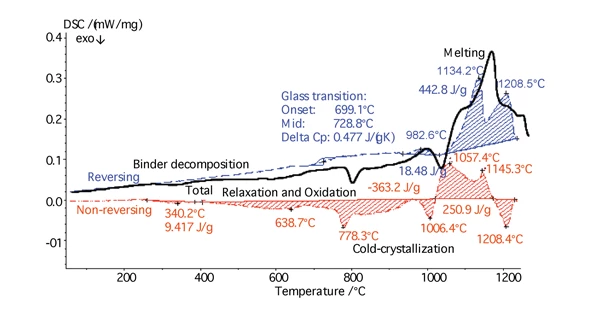Thermal insulation
Mineral Fiber Insulation — Temperature-Modulated DSC (TM-DSC)
Temperature-modulated DSC (TM-DSC) is a tool generally employed for low-temperature applications on polymers.
The STA 449 F1 Jupiter®®and DSC 404 F1 Pegasus®® are the first instruments capable of doing temperature modulation at high temperatures. Presented here are measurement results for mineral fiber insulation. In the total DSC curve, RelaxationWhen a constant strain is applied to a rubber compound, the force necessary to maintain that strain is not constant but decreases with time; this behavior is known as stress relaxation. The process responsible for stress relaxation can be physical or chemical, and under normal conditions, both will occur at the same time. relaxation, OxidationOxidation can describe different processes in the context of thermal analysis.oxidation and Glass Transition TemperatureThe glass transition is one of the most important properties of amorphous and semi-crystalline materials, e.g., inorganic glasses, amorphous metals, polymers, pharmaceuticals and food ingredients, etc., and describes the temperature region where the mechanical properties of the materials change from hard and brittle to more soft, deformable or rubbery.glass transition are overlapped. The Glass Transition TemperatureThe glass transition is one of the most important properties of amorphous and semi-crystalline materials, e.g., inorganic glasses, amorphous metals, polymers, pharmaceuticals and food ingredients, etc., and describes the temperature region where the mechanical properties of the materials change from hard and brittle to more soft, deformable or rubbery.glass transition can only be precisely analyzed by using the reversing part of the TM-DSC curve.
